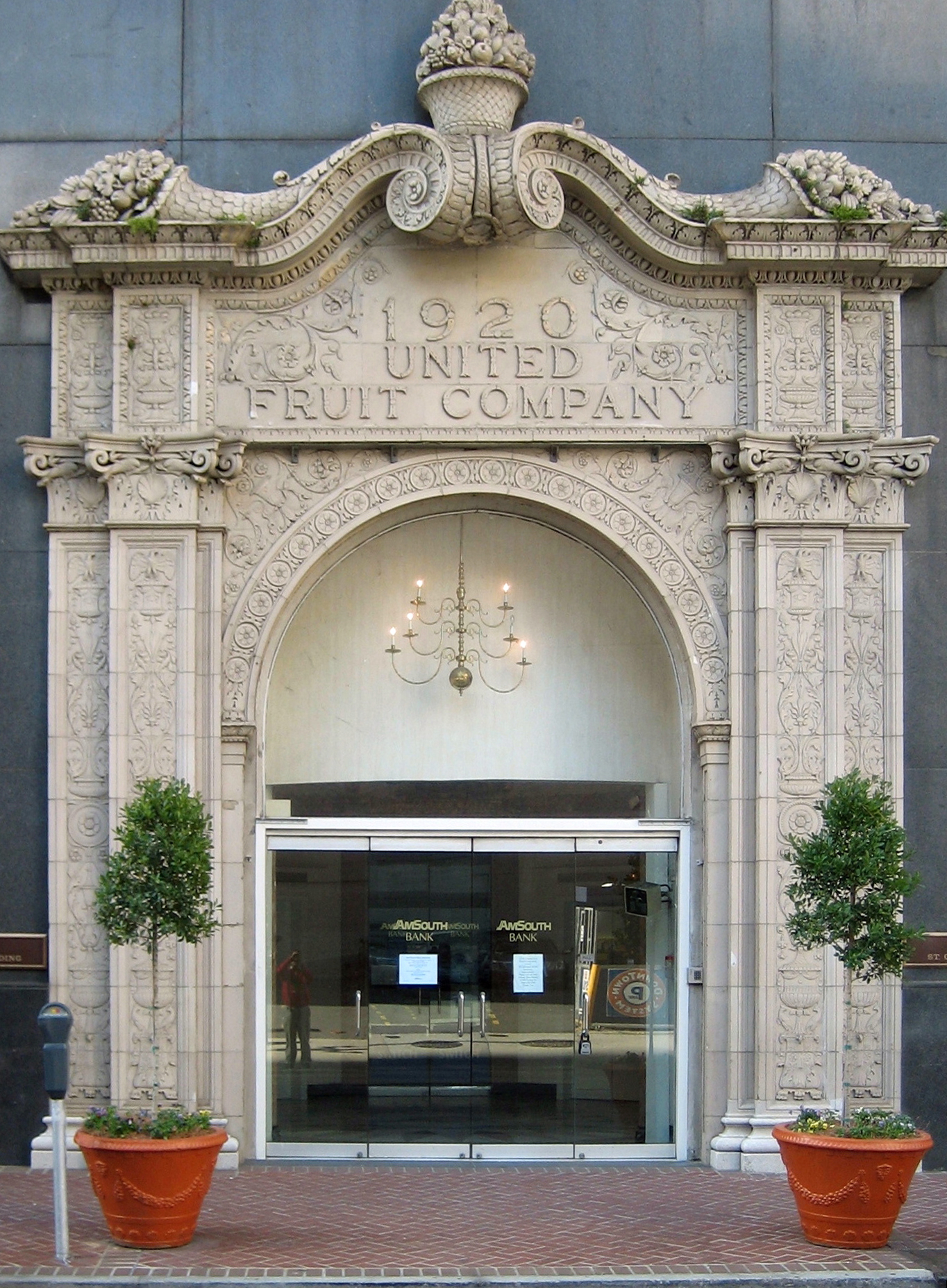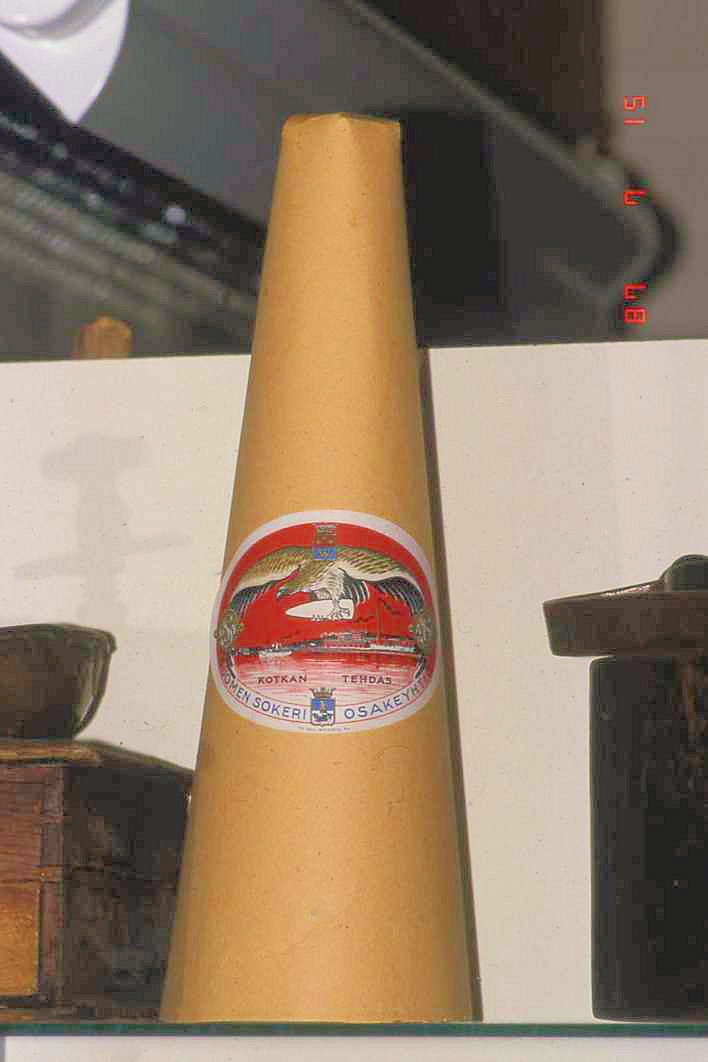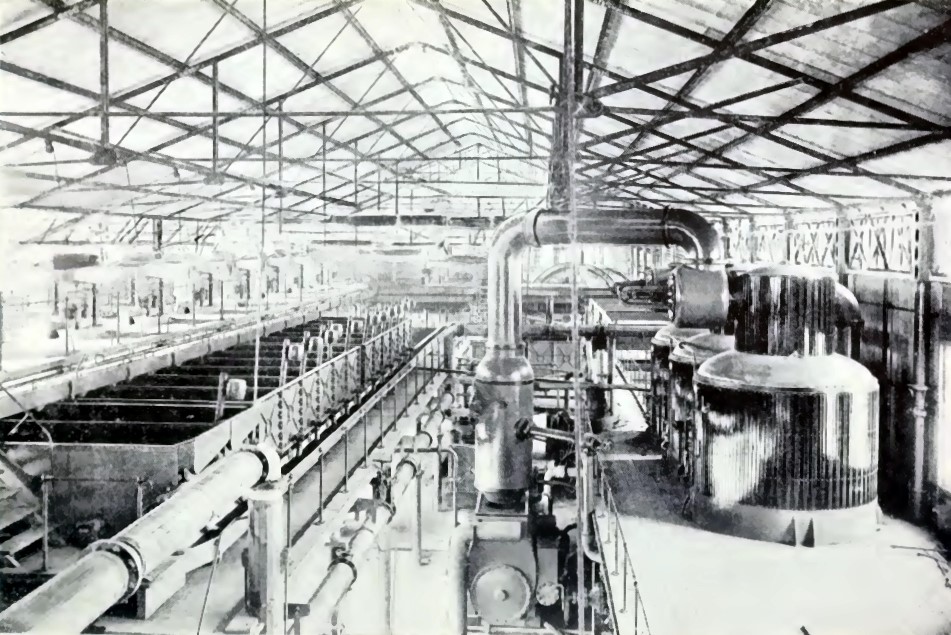|
Albion Plantation
Albion was a sugar plantation in Saint David Parish, Jamaica. Created during or before the 18th century, it had at least 451 slaves when slavery was abolished in the British Empire in 1833. By the end of the 19th-century it was the most productive plantation in Jamaica due to the advanced refining technology it used. By the early 20th century, however, its cane sugar could not compete with cheaper European beet sugar, and it produced its last sugar crop in 1928. It subsequently became a banana farm for the United Fruit Company. Albion gave its name to Albion Cane, Albion Sugar and the settlement of Albion Estate. Location Albion was about 16 miles east of Kingston in Saint David Parish, now Saint Thomas Parish, on the south coast of Jamaica. It was irrigated by the Yallahs River in the east and had its own port facilities at Cow Bay. The road from Kingston to Windward ran through the southern part of the plantation. History Among the earliest owners of Albion plantation we ... [...More Info...] [...Related Items...] OR: [Wikipedia] [Google] [Baidu] |
Edward McGeachy
Edward McGeachy (died c. 1851) was the Crown Surveyor for the county of Surrey in Jamaica. He trained Thomas Harrison, the first Government Surveyor of Jamaica. He owned Bull Park plantation and Brighton Pen in Saint David Parish and in 1837 received compensation for the loss of eight slaves following the abolition of slavery in the British Empire in 1833. Early life and family McGeachy's place and date of birth are unknown, but he described himself as a "colonist" of Jamaica and as having learned surveying "at school". He served a five-year apprenticeship with Francis Ramsay. He married Margaret and they had daughters Rosa, Emma, Ada, and Margaret, and a son Charles Edward Alleyne McGeachy, indicating a family connection to the Alleynes of Barbados. Career After the completion of his apprenticeship, McGeachy was in partnership with Francis Ramsay before working on his own from 1824. He was with McGeachy, Dadley & Smith from 1826 to 1828 in partnership with former apprentices ... [...More Info...] [...Related Items...] OR: [Wikipedia] [Google] [Baidu] |
List Of Plantation Great Houses In Jamaica
This is a list of plantation great houses in Jamaica. Great houses, or plantation houses, were built at a time when sugar cane made Jamaica the wealthiest English colony in the West Indies. Sugar cane was harvested by enslaved peoples. British contemporary architecture was adapted to the tropics with features such as wide wrap-around verandas, jalousies, and sash windows to accommodate the Caribbean climate. * Albion, Saint Thomas. * Edinburgh Castle * Halse Hall * Good Hope, Trelawny * Greenwood, St James * Green Park * Potosi * Roaring River * Rose Hall, Montego Bay.https://rosehall.com/ * Roxbro Castle * Temple Hall * Seville Great House, St. Ann, Jamaica See also * List of plantations in Jamaica This is a list of plantations and pens in Jamaica by county and parish including historic parishes that have since been merged with modern ones. Plantations produced crops, such as sugar cane and coffee, while livestock pens produced animals for ... References {{Plan ... [...More Info...] [...Related Items...] OR: [Wikipedia] [Google] [Baidu] |
United Fruit Company
The United Fruit Company (now Chiquita) was an American multinational corporation that traded in tropical fruit (primarily bananas) grown on Latin American plantations and sold in the United States and Europe. The company was formed in 1899 from the merger of the Boston Fruit Company with Minor C. Keith's banana-trading enterprises. It flourished in the early and mid-20th century, and it came to control vast territories and transportation networks in Central America, the Caribbean coast of Colombia and the West Indies. Although it competed with the Standard Fruit Company (later Dole Food Company) for dominance in the international banana trade, it maintained a virtual monopoly in certain regions, some of which came to be called banana republics – such as Costa Rica, Honduras, and Guatemala. United Fruit had a deep and long-lasting impact on the economic and political development of several Latin American countries. Critics often accused it of exploitative neocolonialism, and ... [...More Info...] [...Related Items...] OR: [Wikipedia] [Google] [Baidu] |
Beet Sugar
A sugar beet is a plant whose root contains a high concentration of sucrose and which is grown commercially for sugar production. In plant breeding, it is known as the Altissima cultivar group of the common beet (''Beta vulgaris''). Together with other beet cultivars, such as beetroot and chard, it belongs to the subspecies ''Beta vulgaris'' subsp. ''vulgaris.'' Its closest wild relative is the sea beet (''Beta vulgaris'' subsp. ''maritima''). Sugar beets are grown in climates that are too cold for sugar cane. The low sugar content of the beets makes growing them a marginal proposition unless prices are relatively high. In 2020, Russia, the United States, Germany, France and Turkey were the world's five largest sugar beet producers. In 2010–2011, Europe, and North America except Arctic territories failed to supply the overall domestic demand for sugar and were all net importers of sugar. The US harvested of sugar beets in 2008. In 2009, sugar beets accounted for 20% of the w ... [...More Info...] [...Related Items...] OR: [Wikipedia] [Google] [Baidu] |
Cane Sugar
Sucrose, a disaccharide, is a sugar composed of glucose and fructose subunits. It is produced naturally in plants and is the main constituent of white sugar. It has the molecular formula . For human consumption, sucrose is extracted and refined from either sugarcane or sugar beet. Sugar mills – typically located in tropical regions near where sugarcane is grown – crush the cane and produce raw sugar which is shipped to other factories for refining into pure sucrose. Sugar beet factories are located in temperate climates where the beet is grown, and process the beets directly into refined sugar. The sugar-refining process involves washing the raw sugar crystals before dissolving them into a sugar syrup which is filtered and then passed over carbon to remove any residual colour. The sugar syrup is then concentrated by boiling under a vacuum and crystallized as the final purification process to produce crystals of pure sucrose that are clear, odorless, and sweet. Sugar ... [...More Info...] [...Related Items...] OR: [Wikipedia] [Google] [Baidu] |
James H
James is a common English language surname and given name: *James (name), the typically masculine first name James * James (surname), various people with the last name James James or James City may also refer to: People * King James (other), various kings named James * Saint James (other) * James (musician) * James, brother of Jesus Places Canada * James Bay, a large body of water * James, Ontario United Kingdom * James College, a college of the University of York United States * James, Georgia, an unincorporated community * James, Iowa, an unincorporated community * James City, North Carolina * James City County, Virginia ** James City (Virginia Company) ** James City Shire * James City, Pennsylvania * St. James City, Florida Arts, entertainment, and media * ''James'' (2005 film), a Bollywood film * ''James'' (2008 film), an Irish short film * ''James'' (2022 film), an Indian Kannada-language film * James the Red Engine, a character in ''Thomas the Tank En ... [...More Info...] [...Related Items...] OR: [Wikipedia] [Google] [Baidu] |
Court Of The Commissioners For Sale Of Incumbered Estates In The West Indies
The West Indian Incumbered Estates Acts were Acts of the Parliament of the United Kingdom of 1854, 1858, 1862, 1864, 1872, and 1886 that allowed creditors and other interested parties to apply for the sale of estates (plantations) in the British colonies in the West Indies despite legal encumbrances that would normally prevent such a sale. The legislation was modelled on the acts that created the Irish Encumbered Estates' Court after the Great Famine of the 1840s that allowed indebted and moribund estates to be sold. Background The acts were modelled on the legislation that created the Encumbered Estates' Court that allowed indebted Irish estates to be sold following the great famine of the 1840s. The Irish act came into force in 1849 and by July 1853, 3.5 million acres of land had been sold, creditors repaid according to the rulings of an independent tribunal, and estates purchased with a Parliamentary title guaranteed to be free of encumbrances.Cust, Reginald John. (1865) A Tr ... [...More Info...] [...Related Items...] OR: [Wikipedia] [Google] [Baidu] |
James Simpson Carson
James is a common English language surname and given name: *James (name), the typically masculine first name James * James (surname), various people with the last name James James or James City may also refer to: People * King James (other), various kings named James * Saint James (other) * James (musician) * James, brother of Jesus Places Canada * James Bay, a large body of water * James, Ontario United Kingdom * James College, a college of the University of York United States * James, Georgia, an unincorporated community * James, Iowa, an unincorporated community * James City, North Carolina * James City County, Virginia ** James City (Virginia Company) ** James City Shire * James City, Pennsylvania * St. James City, Florida Arts, entertainment, and media * ''James'' (2005 film), a Bollywood film * ''James'' (2008 film), an Irish short film * ''James'' (2022 film), an Indian Kannada-language film * James the Red Engine, a character in ''Thomas the Tank En ... [...More Info...] [...Related Items...] OR: [Wikipedia] [Google] [Baidu] |
Sugarcane
Sugarcane or sugar cane is a species of (often hybrid) tall, Perennial plant, perennial grass (in the genus ''Saccharum'', tribe Andropogoneae) that is used for sugar Sugar industry, production. The plants are 2–6 m (6–20 ft) tall with stout, jointed, fibrous stalks that are rich in sucrose, which accumulates in the Plant stem, stalk internodes. Sugarcanes belong to the grass family, Poaceae, an economically important flowering plant family that includes maize, wheat, rice, and sorghum, and many forage crops. It is native to the warm temperate and tropical regions of India, Southeast Asia, and New Guinea. The plant is also grown for biofuel production, especially in Brazil, as the canes can be used directly to produce ethyl alcohol (ethanol). Grown in tropical and subtropical regions, sugarcane is the world's largest crop by production quantity, totaling 1.9 billion tonnes in 2020, with Brazil accounting for 40% of the world total. Sugarcane accounts for 79% of sug ... [...More Info...] [...Related Items...] OR: [Wikipedia] [Google] [Baidu] |
British Guiana
British Guiana was a British colony, part of the mainland British West Indies, which resides on the northern coast of South America. Since 1966 it has been known as the independent nation of Guyana. The first European to encounter Guiana was Sir Walter Raleigh, an English explorer. The Dutch were the first Europeans to settle there, starting in the early 17th century, when they founded the colonies of Essequibo and Berbice, adding Demerara in the mid-18th century. In 1796, Great Britain took over these three colonies during hostilities with the French, who had occupied the Netherlands. Britain returned control to the Batavian Republic in 1802 but captured the colonies a year later during the Napoleonic Wars. The colonies were officially ceded to the United Kingdom in 1815 and consolidated into a single colony in 1831. The colony's capital was at Georgetown (known as Stabroek prior to 1812). The economy has become more diversified since the late 19th century but has relied on r ... [...More Info...] [...Related Items...] OR: [Wikipedia] [Google] [Baidu] |
Sir John Gladstone, 1st Baronet
Sir John Gladstone of Fasque, 1st Baronet, (11 December 1764 – 7 December 1851) was a British merchant, slave owner, politician and the father of the British Prime Minister William Ewart Gladstone. Through his commercial activities he acquired several large plantations in Jamaica and Guyana that were worked initially by enslaved Africans. The Demerara Rebellion of 1823, a slave revolt centred on his estates was brutally crushed by the military. The extent of his ownership of slaves was such that after slavery was abolished in 1833, he received the largest of all compensation payments made by the Slave Compensation Commission. After the passage of the Slavery Abolition Act 1833, Gladstone expelled most African workers from his estates and imported large numbers of Indian indentured-labourers through false promises of providing them schools and medical attention. However, upon arrival they were paid no wages, the repayment of their debts being deemed sufficient, and worked unde ... [...More Info...] [...Related Items...] OR: [Wikipedia] [Google] [Baidu] |






